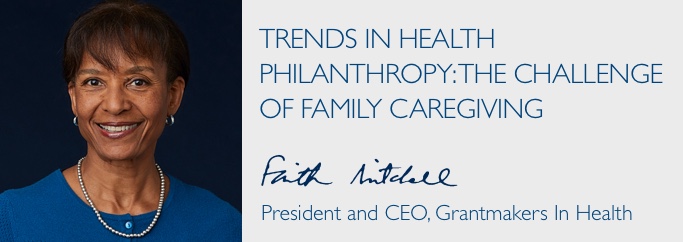
Every day, millions of Americans provide unpaid care to a family member. A few years ago, it was estimated that 43.5 million adults had provided care for someone in the previous 12 months, with most caring for other adults, fewer for children, and a small percentage for both age groups. The care provided in families falls along with a range, from occasional, such as running errands, to moderate, such as monitoring medications and managing finances, to complex, such as end-of-life care. The care provided by family members is vitally important—yet it is generally not financially compensated and usually not well-integrated into health care systems. Caregivers are financially and emotionally stressed by their responsibilities. Ultimately, failing to support them costs health care systems, the economy, and communities.
A recent GIH meeting, cosponsored with Grantmakers In Aging, brought together foundations, government agencies, advocates, and researchers to discuss investing in policies and systems that support family caregivers. When one of the speakers commented that no one plans to be a caregiver, I reflected on my own experience, with the thought that being a caregiver is like being enlisted into an army that you never anticipated joining. It is an isolating experience akin to venturing into uncharted territory without a map, especially when compared to a major life event like becoming a parent, where there is time to plan and collect guidance from others, and for which there are supportive workplace and health care systems in place.
Current challenges to supporting family caregivers are likely to be exacerbated in the future because there is an increasing gap between the demand for family caregivers and the available supply. Because of changes to American families, women’s engagement in the workforce, and other factors, the pool of potential caregivers is shrinking—just as the number of older adults who are likely to need their assistance is rapidly growing. Looking ahead, the health care system can no longer assume that a stay-at-home wife, daughter, sister, or mother (as it has customarily been) will be on-hand to take responsibility for ailing family members.
As a forthcoming GIH Issue Focus will describe in more detail, the good news is that progress is being made, especially in states, which are family caregiving laboratories for experimentation. For example, some states are making caregivers explicit partners in discharge planning, and there is a discussion of making them eligible for tax credits and paid family leave. There are also efforts underway to develop a national strategy, building off the recommendations of the National Academies of Sciences, Engineering, and Medicine’s Families Caring for an Aging America report.
Health funders can play an important role in raising the visibility of family caregiving, improving our understanding of its dimensions, and addressing the challenges it presents. Areas of involvement, locally and nationally, include:
- improved data collection about family caregiving (e.g., types, levels, costs, and whether there are important racial or ethnic dimensions of which we are not aware);
- diffusion of information about new and existing programs, practices, and models that improve support for family caregivers;
- analysis of current and future needs for types and level of services at the community level (e.g., for people living at home with Alzheimer’s); and
- helping answer the broad and important question, “What should a well-functioning community look like?”

